While salmon itself is healthy for cats, smoked salmon could put your cat’s health at risk.
From a too-high salt content to potential bacterial contamination, smoked salmon is not the best type of food for a cat.
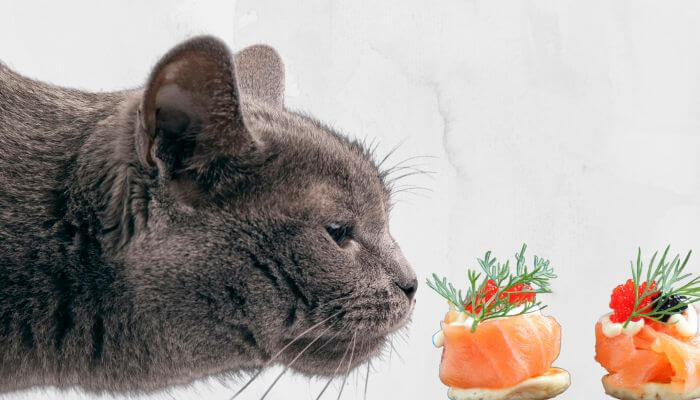
Small amounts can be safe, but there are better alternatives.
Contents
How Much Smoked Salmon Is Safe For A Cat?
There are no dietary guidelines when it comes to actual smoked salmon, and that’s because veterinarians don’t really recommend it as a main source of food for cats.
If your cat is really crazy about smoked salmon and you can’t deal with their ‘advances’ when you’re trying to eat, you should either avoid feeding it to them altogether or give them a limited amount.
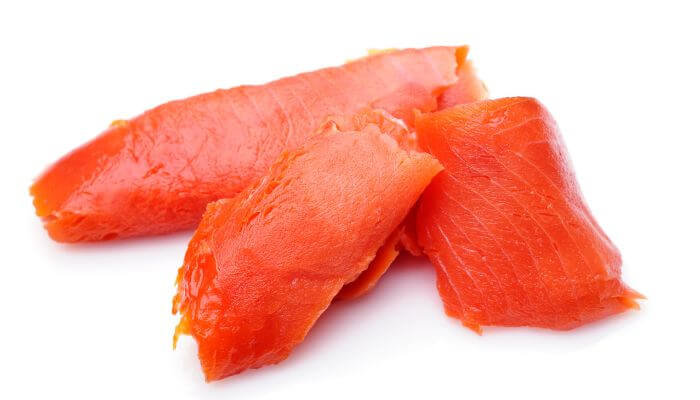
One teaspoon worth of smoked salmon should be more than enough for an adult cat.
How Often Can Cats Eat Smoked Salmon?
Since smoked salmon is extremely rich in salt, it is not a good idea to give it as a snack to cats on a daily basis.
Once a week or once every two weeks is the better choice in this case.
Smoked salmon should always be seen as a potentially unhealthy treat rather than a main food for pets.
The Dangers Of Eating Too Much Smoked Salmon:
Cats can have fish as a main source of protein, and it is quite a lean and healthy type of food for them, too. However, you are exposing your pet to the following risks by choosing to feed them smoked salmon.
1. Sodium-ion poisoning
There are many debates online when it comes to salt and whether or not it is good for animals.
Sodium is an essential nutrient for all mammals because it is involved in a number of normal processes such as the exchange of substances between cells.
Sodium also regulates blood pressure and makes it possible for nerve impulses to be transmitted properly across the body, not to mention that it also prevents dehydration, to some extent.
But there is enough salt in your cat’s dry and wet food. Excess sodium can cause havoc, especially to the cardiovascular system.
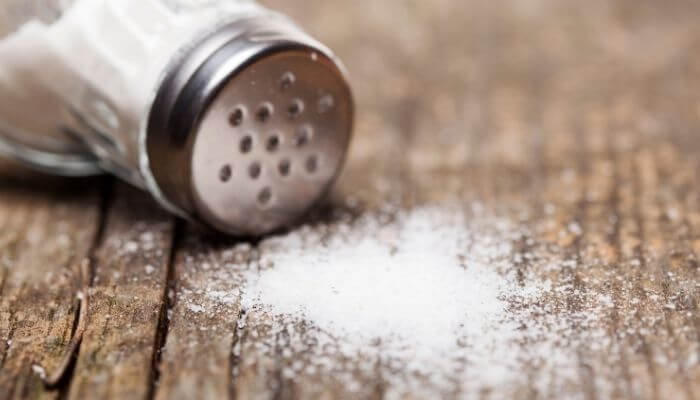
To give you an idea of just how much salt there is in smoked salmon, 100 grams of this food typically contains over 750mg of this nutrient.
Cats are supposed to have just 20 mg of sodium per day, so you do not even have to do the math to understand how detrimental that amount can be for them.
Sodium poisoning can cause the following symptoms:
- Diarrhoea and vomiting
- Lack of appetite
- Tremors
- Incoordination
- Excessive thirst/urination
- Seizures, coma, and death
2. Obesity
While one very small piece of smoked salmon every now and then is clearly not going to influence your cat’s weight to the extent that they become obese immediately, fatty foods should be avoided in general.
If your cat is spayed or neutered and you keep them indoors at all times, they will have the predisposition to put on weight as they age.
Excess body weight can have a variety of health complications, mostly pertaining to the immune system and the endocrine system.
In time, obesity can lead to cardiovascular disease. All of that weight can also put pressure on your pet’s joints and lead to arthritis, especially in their senior years.
Salmon is among the fattiest fish, so there are better choices, not to mention that plain cooked white fish (steamed) is always recommendable compared to any type of smoked fish.
3. Heavy Metals
Heavy metals such as mercury are a reality when it comes to fish, in general, and species such as salmon, in particular. Besides it, tuna, mackerel, and cod are said to contain heavy amounts of mercury.
While cats don’t get heavy metal poisoning immediately after having one of these fish varieties, the symptoms can occur in time.
Some health complications that can arise from being exposed to mercury, zinc, or lead range from gastric upset to kidney failure and anaemia.
4. Parasites
Like any other animals, cats can get intestinal parasites from other animals, but also from the environment they live in and the food they eat.
Raw fish can carry an extremely common tapeworm called Diphyllobotrium latum.
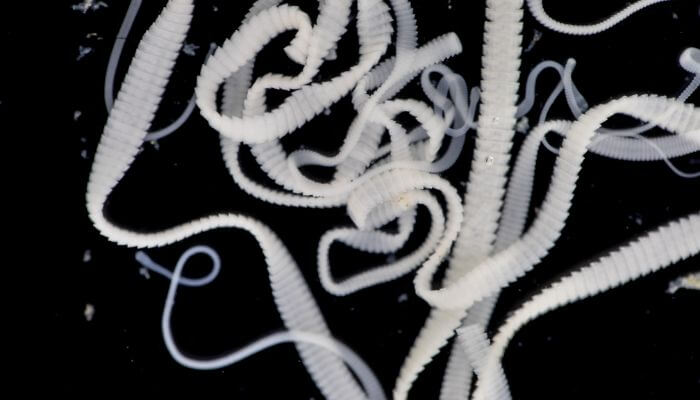
Even humans can catch a parasite called Anisakis simplex, also known as the herring worm, from raw fish enjoyed with sushi, for example.
Salmonids, meaning salmon and other fish in the same family, can carry Diphyllobotrium dendritricum.
If your cat gets this parasitosis from smoked salmon, they will exhibit symptoms of gastrointestinal disease, such as the following:
- Diarrhoea
- Vomiting
- Weight Loss
This is a risk that you might be exposing your cat to depending on whether the fish is or not infested with a parasite or not.
5. Listeria monocytogenes
Theoretically, cold smoked fish should be safe to eat, but the truth is that as a consumer, you do not have control over how judiciously the salmon was smoked and in what conditions.
While quite uncommon, smoked salmon can sometimes be contaminated with Listeria monocytogenes, a bacterium that can cause septicaemia or meningitis in both humans and animals.
There is no way of preventing this infection other than by properly cooking the fish.
Smoking meat does not kill bacteria.
Listeria can be found in other foods, such as soft cheeses or raw milk, along with cold diced chicken.
The incubation period of the infection can be very long, sometimes lasting for more than a month or two, which is why you might not even know how your cat ended up being sick with Listeriosis.
The fatality rate of this disease is considered high, with more than 15-20% of all animals losing their life after developing Listeriosis.
My Cat Ate A Whole Tin Of Smoked Salmon…What Should I Do?
The only piece of advice that we have for you in this situation is to take your cat to the veterinary clinic as soon as possible.
Even if the tin isn’t contaminated with heavy metals, parasites, or bacteria, it could have dangerous sodium levels that might lead to your cat suffering from salt poisoning in a record amount of time.
Do not try to induce vomiting by yourself.
Most cats do not react well when it comes to owners trying to shove pencils or other objects down their throats so as to make them vomit.
And while this might work with some dogs, giving cats a solution of hydrogen peroxide to cause vomiting is also not recommended.
You actually have a higher chance of causing aspiration pneumonia rather than making your pet throw up.
Which Fish is Safe To Feed My Cat Regularly?
Most cats love fish as it is an excellent source of protein for them as obligate carnivores.
Most fish species are safe to give to cats. The ones providing them with the most benefits range from salmon and sardines to tuna.
All of these species have high amounts of omega fatty acids, which are known to protect your cat’s heart health and prevent cognitive dysfunction along with arthritis, to some extent.
Buy fresh fish and cook it without adding any spices or seasonings and give your cat a small piece every now and then.
Baking, grilling, and steaming are the best cooking methods.
Fried fish is not safe to give to cats — particularly the breading, since it is not only extremely high in calories, but it usually contains spices, too.
You can also choose a high-quality fish diet for your cat, if she seems to be a great aficionado. Try to opt for one that is not made with fish by-products but actual fish, instead.
Read the label to make sure it is free of artificial colours, preservatives, binders, and anything else that could affect your pet’s health in the long run (some of these substances are carcinogenic).

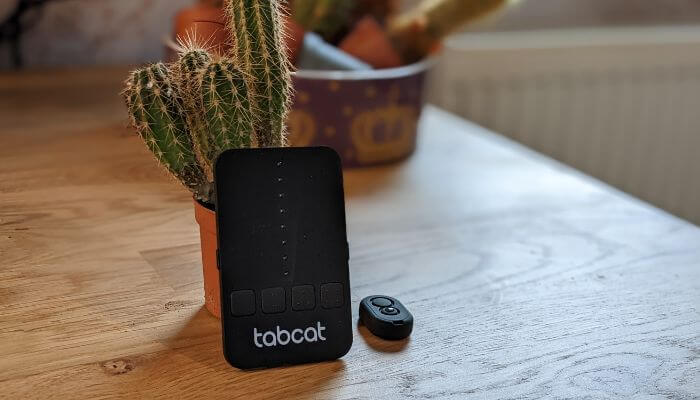
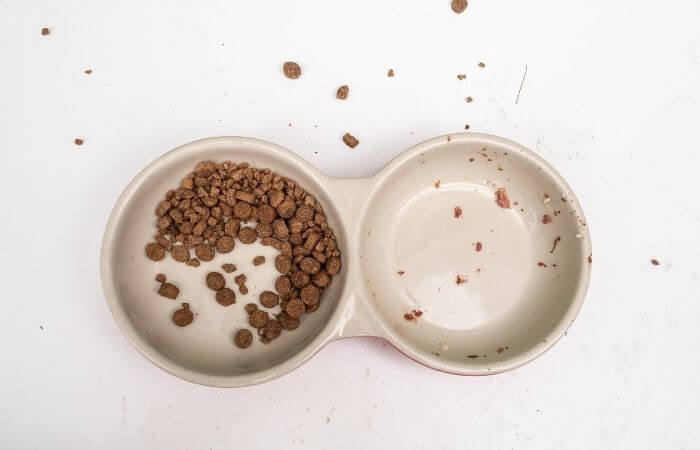

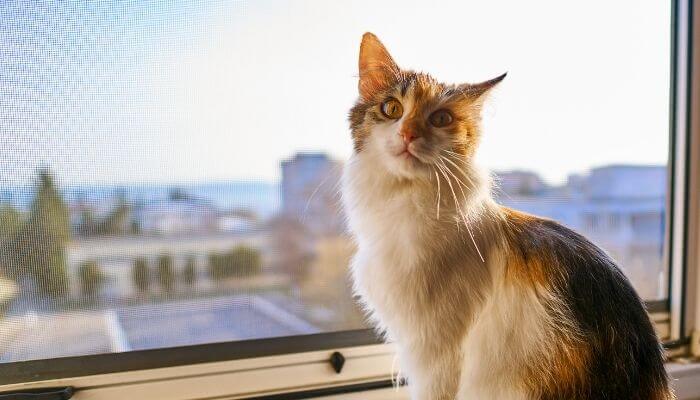
Leave a Comment